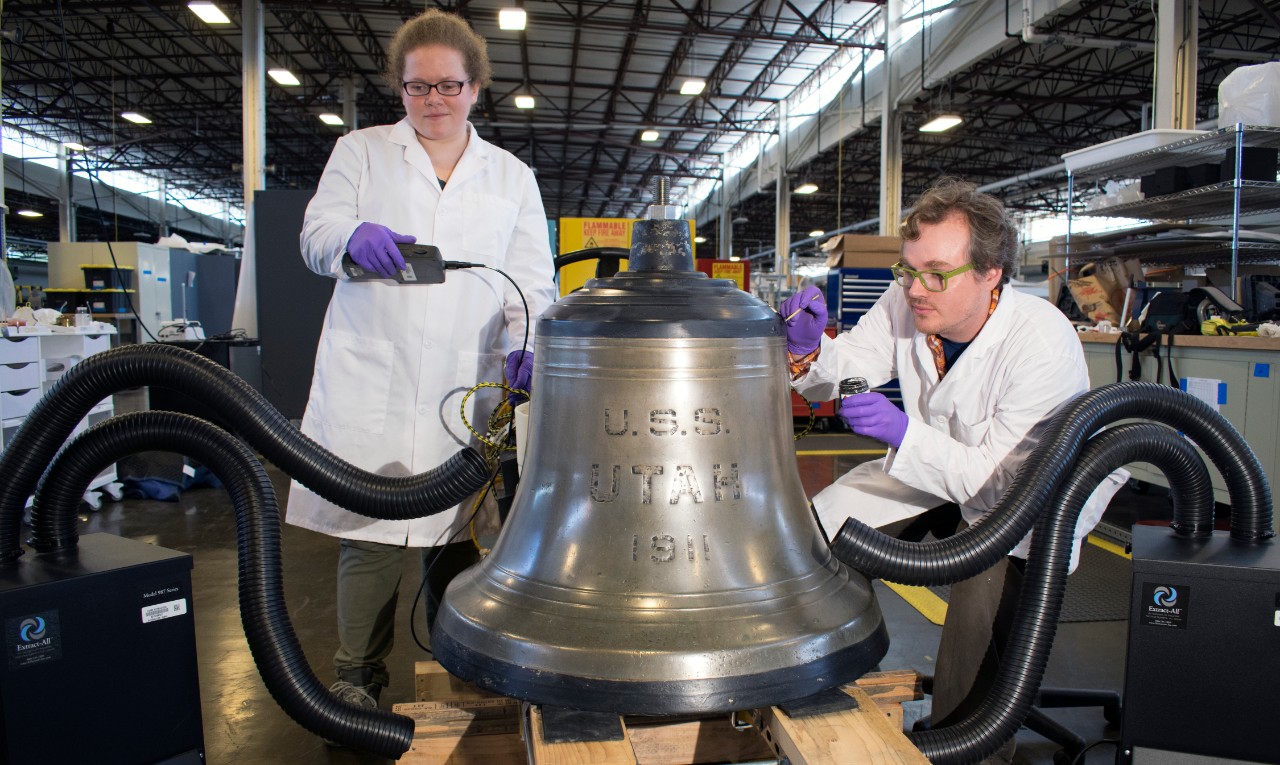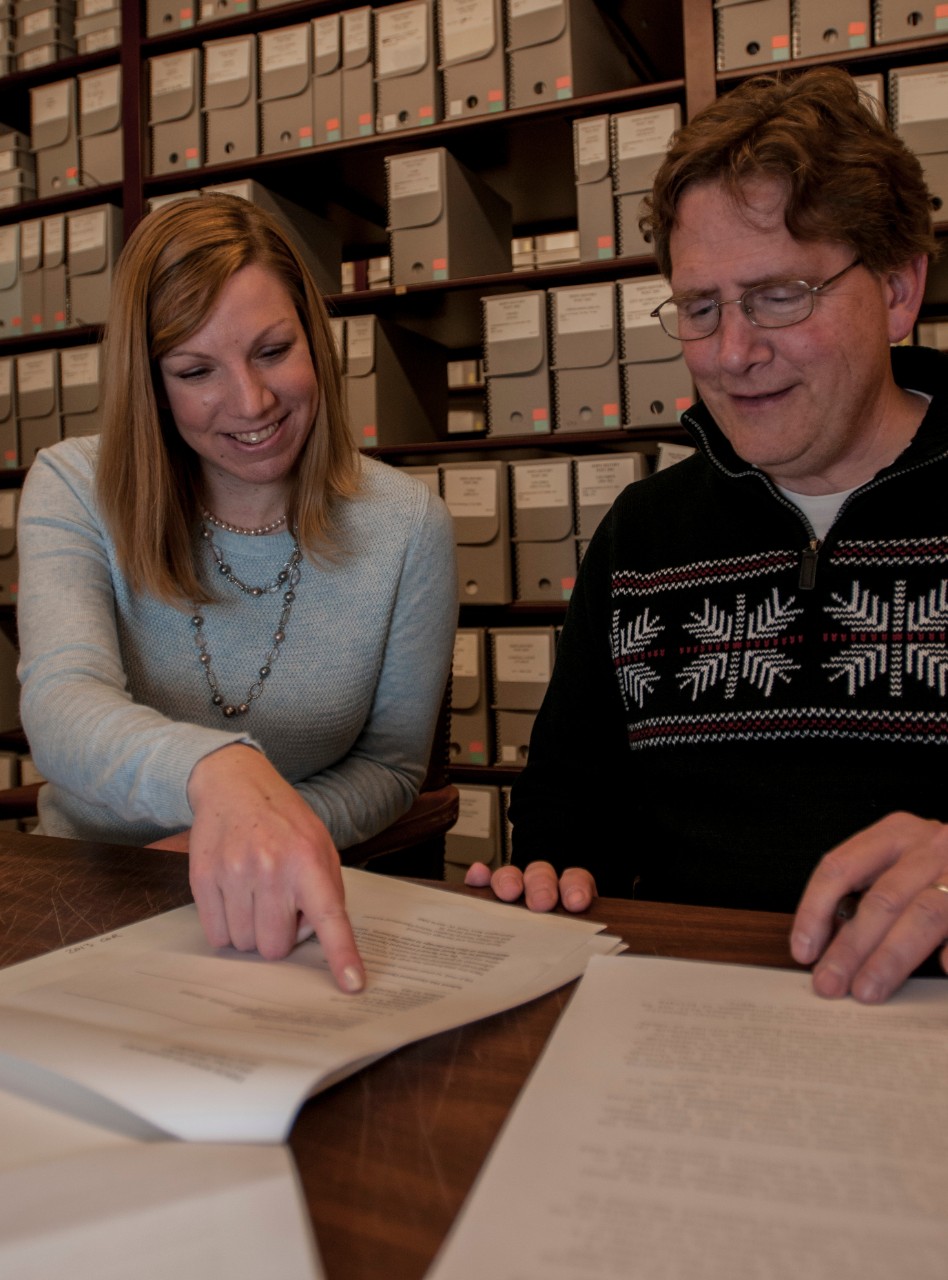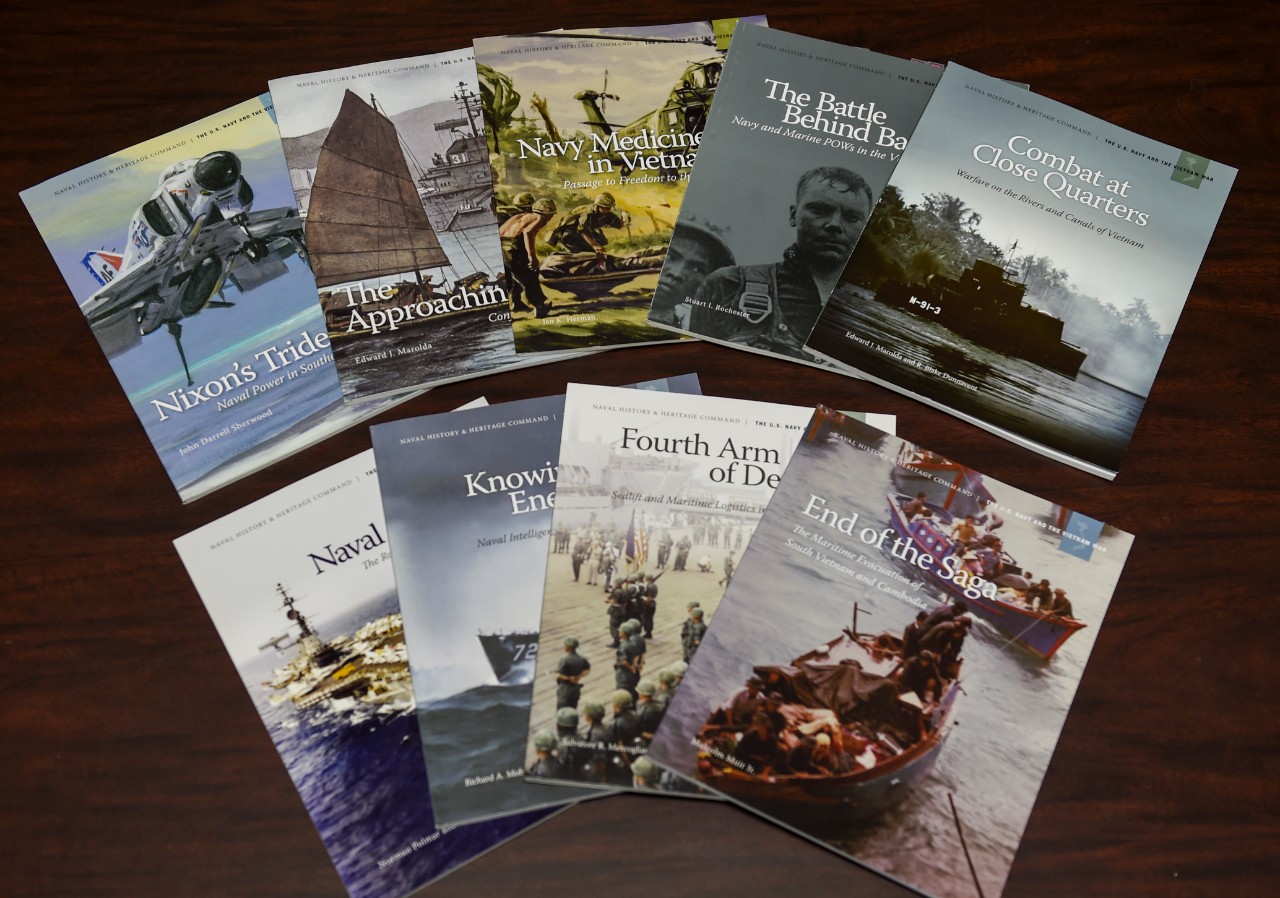Command Operations Reports, deck logs, ships’ histories, ships’ bells and plaques – these are just a few examples of what veterans and veteran organizations ask about more than 2,000 times each year of the Naval History and Heritage Command in Washington, D.C. And the experts at the Washington Navy Yard deliver the answers.

Providing this service and support goes beyond a checklist or command guidance; it is an integral part of the command vision and why the command exists, according to NHHC Director Mr. Sam Cox, a retired two-star admiral.
“We have a moral obligation to let those who serve now - and those who have served - know that their sacrifice will always be remembered, honored and valued,” said Cox. “Our responsibility is to give our veterans the support they need, when they ask, and to do everything we can to assist them. We do this every day.”
Because veterans are such a significant stakeholder group, NHHC’s website has a prominent area on the home page dedicated to “Resources for Veterans,” which includes listings of and links to carrier and squadron deployment lists, Navy photographs, how to obtain replacement medals, how to obtain copies of crew lists and muster rolls, and much more.
Some people are unable to find the information they need on the website, or don’t have access to the web, so those requests come to NHHC directly from veterans themselves, as well as via veterans’ organizations and elected officials. Regardless of who is asking, experts at NHHC focus on getting the right information to the veteran as quickly as possible.
Maren Read, who heads the Navy Archives, has been with the command for two years and said the majority of requests she and her team get are to help assist with veteran claims.
“Many veterans are trying to access deck logs to get dates and locations of the ships they served on,” Read said. “But if they’re not sure of a timeframe, we get them command operations reports from those ships. That can help them narrow down their requests and help them get the information promptly. Deck logs can be huge – hundreds of pages – but a command operations report may only be 10 or so pages.”
U.S. Navy ship deck logs more than 30 years old are transferred to the National Archives, but command histories aren’t transferred until they are at least 50 years old. Read and her reference team review every request and process each one as quickly as possible to identify where the records are. Some records from modern operational units, have to be processed through a Freedom of Information Act request or closely reviewed for restricted information, such as personally identifiable information, which is not releasable. But if alternate records might help answer the veteran’s question, Read says they send it. If veterans wish to reach out to NHHC directly for deck logs, they must submit a FOIA request. Information on how to submit a request can be found on the NHHC website, and is listed at the end of this article.

Some requests can’t be answered by NHHC, because that information is held elsewhere. For instance, military personnel files are held at the National Personnel Records Center, managed by the National Archives. Classified material must go through a mandatory declassification review, and declassified material must be reviewed by the original classification authority before it can be released. This does take time, Read said, but ensuring the correct information is provided is very important.
“My team and I take this very seriously. Our job is not only to preserve records, but also to make them accessible,” Read said. “If we properly maintain, index and inventory our records, veterans who need this information can get it. They served their country, and it’s our responsibility to help them.”
Not every veteran request has to do with obtaining ship records or other documentation. Some veterans want to donate artifacts to go into the Navy collection, and some want to borrow artifacts for reunions or other events. Jeff Bowdoin is the head of NHHC’s Curator Branch and has been with the command for more than five and a half years and has seen a lot of different items come to the command.
“Every artifact that someone wants to donate is unique and tells a special story about the service member,” said Bowdoin. “They tell a powerful story of our history and heritage.”
One item that stands out to Bowdoin and his team is a prosthetic leg donated by an Explosive Ordnance Disposal lieutenant whose leg was amputated when his patrol was attacked and a roadside improvised explosive device hit his vehicle in Baghdad in 2006. He received a prosthetic leg and after intense rehabilitation returned to active duty. When the officer heard about NHHC’s role in preserving stories and artifacts that convey Navy heritage, he donated an older but brightly decorated prosthetic leg to the collection as he received a new replacement.
“We have medals, uniforms and other personal artifacts that tell the stories of individuals that served in the Navy,” Bowdoin explained. “We are lacking material culture from more current Navy operations, and this donation really tells the story of Navy’s Wounded Warriors; their strength, resilience and dedication to our country.”
The officer is donating his uniform as well.
The Curator Branch also receives requests from reunion and veteran groups to display artifacts during specific events.
“We usually receive a request for a ship’s bell, as many Sailors see it as the voice of the ship,” Bowdoin said. “Some may request the last national ensign flown by the ship, but textiles are fragile so we have to examine those artifacts carefully to ensure they are in suitable condition to be loaned.”
NHHC continues to organize and make available important documents and records that can assist veterans and their families in locating information they need. Below are links to these references on the NHHC website:

Resources for Navy Veterans: Information and links to ship histories, Navy photographs, carrier and squadron deployment lists, how to obtain deck logs, information on obtaining replacement medals, and more - https://www.history.navy.mil/research/archives/resources-for-veterans.html
Command Operations Reports: Digitized reports from many Navy commands - https://www.history.navy.mil/research/archives/command-operations-reports/ships.html
Deck log access: Details on where deck logs are held and how to access them - https://www.history.navy.mil/about-us/services-and-policies/deck-log-access.html
Donating materials: Information on how to donate papers, books, documents manuscripts and artifacts - https://www.history.navy.mil/get-involved/donate-materials.html
Loan Programs: Information on how to request an artifact loan - https://www.history.navy.mil/get-involved/loan-programs.html
Ships’ histories: Histories of Navy ships from 1775 to the present - https://www.history.navy.mil/research/histories/ship-histories/danfs.html
Navy museums: Links and locations to each of the Navy’s 10 museums - https://www.history.navy.mil/visit-our-museums.html
Points of contact: E-mails and phone numbers for key offices at NHHC - https://www.history.navy.mil/about-us/contact/directory.html
Publications: Documentary histories, NHHC bibliographies and more - https://www.history.navy.mil/our-collections/artifacts.html
Contact information:
- General Inquiries: nhhcpublicaffairs@navy.mil, 202-433-7880
- Ship and aviation unit records: archives@navy.mil, 202-433-3224
- Artifact donations: nhhccurator@navy.mil, 202-433-7873
- Operational records and personal papers: archives@navy.mil, 202-433-3224
- Photographic section: nhhcphotoarchives@navy.mil, 202-433-2765
- Navy Department Library: 202-433-7833
The Naval History and Heritage Command, located at the Washington Navy Yard, is responsible for the preservation, analysis, and dissemination of U.S. naval history and heritage. It provides the knowledge foundation for the Navy by maintaining historically relevant resources and products that reflect the Navy's unique and enduring contributions through our nation's history, and supports the fleet by assisting with and delivering professional research, analysis, and interpretive services. NHHC is composed of many activities including the Navy Department Library, the Navy Operational Archives, the Navy art and artifact collections, underwater archeology, Navy histories, ten museums, USS Constitution repair facility and the historic ship Nautilus.


